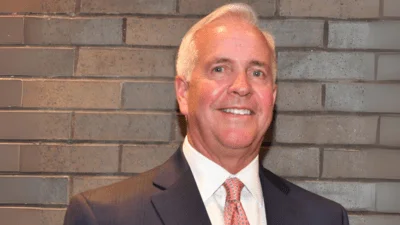Rachel Ventura, State Senator 43th District (D) | https://www.facebook.com/SenatorVentura
Rachel Ventura, State Senator 43th District (D) | https://www.facebook.com/SenatorVentura
According to the Illinois General Assembly site, the legislature summarized the bill's official text as follows: "Creates the Judicial Campaign Reform Act. Creates a voluntary program of public financing of election campaigns for the offices of judges of the Illinois Supreme Court and Appellate Court, administered by the State Board of Elections. Establishes funding mechanisms, terms of participation, and a process for the certification of candidates. Sets mandatory contribution limits with respect to all judicial election campaigns. Provides for penalties for violations of the Act. Makes other changes. Amends the State Finance Act to create the Illinois Judicial Election Democracy Trust Fund. Amends the Illinois Income Tax Act to make conforming changes. Effective January 1, 2026."
The following is our breakdown, based on the actual bill text, and may include interpretation to clarify its provisions.
In essence, this bill establishes the Judicial Campaign Reform Act, introducing a voluntary public financing program for judicial election campaigns related to the Illinois Supreme Court and Appellate Court, starting in 2027. It sets up the Illinois Judicial Election Democracy Trust Fund to support these campaigns, funded by $40 million annual transfers from state income tax revenues, tax checkoff contributions, and other sources. Candidates must meet specific contribution and reporting criteria to qualify. The bill institutes contribution limits, mandates fair election debit cards for campaign costs, and outlines penalties for violations, aiming to ensure transparency and fairness in judicial elections. Campaigns using public funds are strictly regulated, and any unspent funds must be returned. The law includes provisions for appealing candidate certification decisions and requires regular reporting to the General Assembly on the program's effectiveness. The act becomes effective Jan. 1, 2026.
Rachel Ventura has proposed another five bills since the beginning of the 104th session.
Ventura graduated from Benedictine University in 2002 with a BS.
Rachel Ventura is currently serving in the Illinois State Senate, representing the state's 43rd Senate District. She replaced previous state senator Eric Mattson in 2023.
Bills in Illinois follow a multi-step legislative process, beginning with introduction in either the House or Senate, followed by committee review, floor debates, and votes in both chambers before reaching the governor for approval or veto. The General Assembly operates on a biennial schedule, and while typically thousands of bills are introduced each session, only a fraction successfully pass through the process to become law.
You can read more about bills and other measures here.
| Bill Number | Date Introduced | Short Description |
|---|---|---|
| SB0143 | 01/17/2025 | Creates the Judicial Campaign Reform Act. Creates a voluntary program of public financing of election campaigns for the offices of judges of the Illinois Supreme Court and Appellate Court, administered by the State Board of Elections. Establishes funding mechanisms, terms of participation, and a process for the certification of candidates. Sets mandatory contribution limits with respect to all judicial election campaigns. Provides for penalties for violations of the Act. Makes other changes. Amends the State Finance Act to create the Illinois Judicial Election Democracy Trust Fund. Amends the Illinois Income Tax Act to make conforming changes. Effective January 1, 2026. |
| SB0179 | 01/17/2025 | Amends the Unified Code of Corrections. Provides that the Prisoner Review Board shall place no additional restrictions, limitations, or requirements than that provided by the statute creating the procedure for medical release. Provides that upon a determination that the petitioner is eligible for a hearing on medical release, the Prisoner Review Board shall: (1) provide public notice of the petitioner's name, docket number, counsel, and hearing date; and (2) provide a copy of the evaluation and any medical records provided by the Department of Corrections to the petitioner or the petitioner's attorney upon scheduling the institutional hearing. Provides that a hearing on a petitioner's application for medical release is public unless the petitioner requests a non-public hearing. Provides that members of the public shall be permitted to freely attend public hearings on medical release without restriction. Provides that upon denying an eligible petitioner's application for medical release, the Prisoner Review Board shall publish a decision letter outlining the reason for denial. Provides that the decision letter must include an explanation of each statutory factor and the estimated annual cost of the petitioner's continued incarceration, including the petitioner's medical care. Makes technical changes. |
| SB0042 | 01/13/2025 | Amends the Illinois Vehicle Code. Removes the requirement that cannabis within any area of a motor vehicle must be in an odor-proof container. Provides that if a motor vehicle is driven or occupied by an individual 21 years of age or over, a law enforcement officer may not stop or detain the motor vehicle or its driver nor inspect or search the motor vehicle, the contents of the motor vehicle, or the operator or passenger of the motor vehicle solely based on the odor of burnt or raw cannabis. |
| SB0043 | 01/13/2025 | Amends the Illinois Century Network Act. Specifies that the Illinois Century Network shall be a service creating and maintaining high speed telecommunications networks that provide reliable communication throughout Illinois (rather than a service creating and maintaining high speed telecommunications networks that provide reliable communication links for wholesale connections with other registered or certified providers and the direct communication needs of various anchor institutions throughout Illinois). Authorizes the Illinois Century Network to develop an end-to-end broadband network that may include, but may not be limited to, middle-mile and last-mile infrastructure. Deletes provisions requiring the Network to avoid duplication of existing communication networks if those networks are capable of maintaining sufficient capacity to meet the requirement of anchor institutions. Effective immediately. |
| SB0044 | 01/13/2025 | Amends the School Code. Provides that, subject to appropriation and beginning with the 2025-2026 school year, the State Board of Education shall award competitive grants on an annual basis to school districts that submit a grant application to the State Board requesting funds to purchase an electric vehicle to be used for student driver education courses. Requires the State Board to disseminate a request for applications for grants that shall be accepted on an annual basis. Requires the State Board to establish procedures for submitting requests for grants and issuing funds to approved applicants. Sets forth priority determinations for application selection by the State Board if the appropriation amount in a fiscal year is less than the amount required to fund all applications for grants. Establishes application requirements. Allows the State Board to adopt rules to implement the provisions. |
| SB0045 | 01/13/2025 | Amends the Humane Care for Animals Act. Provides that no person may intentionally drag or pull any bovine by its tail by any means for the purpose of entertainment, sport, practice, or contest. |
| SB0046 | 01/13/2025 | Amends the Unified Code of Corrections. Deletes a provision that it is an aggravating factor in sentencing that the sentence is necessary to deter others from committing the same crime. |






 Alerts Sign-up
Alerts Sign-up